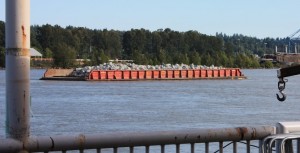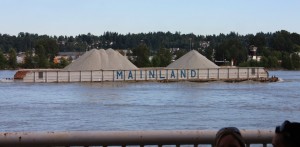Lest I am seen as always writing negative stuff here, bitching and complaining about the state of our environment, I thought I would point out some local positives today. (back to complaints tomorrow…)
It is great to read that City Hall (both the elected folk and the Staff) are publicly saying what much of the public has been saying since the UBE situation first cropped up last year. The end of the UBE and the indefinite future of the NFPR could have very positive consequences for New Westminster. Instead of our waterfront being defined as a through-fare for trucks moving containers from “Port Facilities” to places like Port Coquitlam and Port Kells and Port Mann, it can be a place where businesses grow, where people walk, where taxes are paid, and where the Downtown meets the waterfront. (Notably, this can all be done without spending a billion dollars putting vehicles in the fancy tunnels that would only result in increased traffic chaos at each end). Think the Quays of Old Port Montreal or the Peoria Waterfront, (which both have rails near the waterfront) or Spokane, or any of a dozen other examples of cities that have reconnected with their River Waterfront.
Then this rather fanciful story comes out. It looks very preliminary, but there may some real niche markets for this service. Driving from PoCo by the old Gillnetter Pub to the Canada Line in Richmond is only 35 km by road, but takes the best part of an hour during rush hour. The same trip by Transit takes a bus, Skytrain and Canada Line, and more than an hour and a half (and a three-zone fare). The same trip by high-speed catamaran, about 25km of River, could take less than an hour.
But yes, it is preliminary. I wonder what the economic reality is, with it apparently costing $1000/hr to run one of these boats, and an estimated (by me) seating capacity of 100 people, you need to charge $10 for a one-way trip to break even, and sell out every trip. I also wonder about how fast the actual ferries could go. There are off-the-shelf cats that can do 25 knots (~40 km/h) in good conditions, but the Fraser is both narrow in places and laden with logs and other debris. Popping a 3-foot diameter log at 40 km/h is going to be a bad day for the engineer in charge.
As a mass transit system, this might be wanting. As a niche market to connect poorly-connected hubs, there is potential. But I wonder what those hubs are…
But funny how we don’t think about the transportation markets that already operate on the River. I was sitting at the beer garden during Fraser Fest, listening to The NWSS band play some kicking R&B (I do love a 4-piece horn section), and I noticed this guy leaving the Southminster Dock in Surrey. They run barges of trailers to Vancouver Island a few times a day. Each barge carries 40 or so trailers. No doubt a more economic approach than having 40 trucks and drivers sitting in a BC ferry line-up.
I also a saw a barge load of rock rip-rap, enough to fill 100 trucks.
And a barge full of sorted gravel, enough to fill another 100 trucks.
3 tug boats doing the work of 240 trucks. This is the future of our waterfront, folks.
Finally, researching this topic, I ran into a new (to me) blog in New Westminster. I don’t know who this guy is, but it looks like he has been at it for a while, and he recently quoted Phil Plait, so he must be a gentleman and a scholar. Go over there and give him a read and a comment. We can forgive him for being from Toronto; you can’t choose where you are born, you can only choose where you live!


“Each barge carries 40 or so trailers. No doubt a more economic approach than having 40 trucks and drivers sitting in a BC ferry line-up.”
No doubt far less economical.
Those trailers are not allowed on BC Ferries because they contain hazardous materials, which pose an increased risk to the public passengers.
Except that most dangerous goods are permitted (with strict rules) on BC ferries:
http://www.bcferries.com/travel_planning/dangerous_cargo-commercial.html
…and not all the trailers they are transporting have placards.
So “hazardous materials” might be part of thier market, but not all of it.
Thanks for the link! Let the record show, though, that I did choose to live in Toronto as well; I wasn’t born there.
Chose to live in Toronto? Well, your recovery from mental illness seems to be progressing satisfactorily.
I did enjoy digging through a bit of your archive. Good stuff!